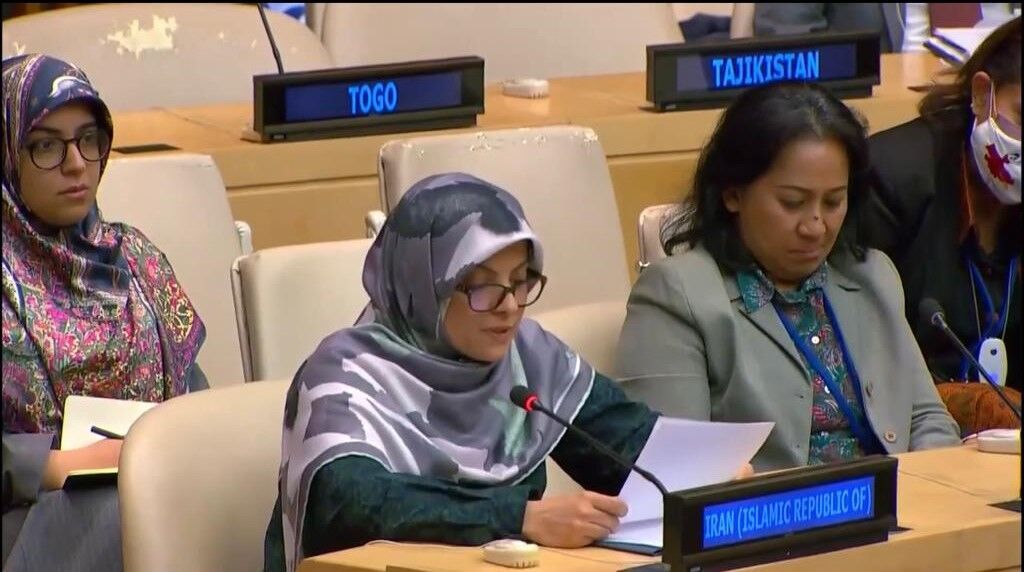Ambassador and Deputy Permanent Representative of the Islamic Republic of Iran to the United Nations Zahra Ershadi has said, “We as OIC members must provide women’s empowerment priority by recognizing and resolving the root causes, and anti-Muslim prejudice.”
Addressing a UN meeting entitled “Women in Islam: Understanding the Rights and Identity of Women in the Islamic World”, in New York late on March 9, 2023, Ershadi said, “We must intensify our efforts to raise public awareness of the negative effects of these practices as well as inside the UN intergovernmental processes in order to achieve this end. This can be done by promoting more inclusive and equal engagement for all Muslim women.”
Following is the full text of Ershadi’s statement to the meeting:
Mr. Chair,
The demonization of Islam is basically done by simplifying the concept of Islam and portraying it, as the religion of discrimination. Throughout history, the western media has been trying to distort Islam by spreading falsehoods about our religion and claiming that women are hugely discriminated against. But this couldn’t be further from the truth. In fact, Islam places great importance on the rights and dignity of women, and this has been the case since the very beginning.
Mr. Chair,
From the time of the Prophet Muhammad (peace be upon him), women played an active and significant role in the spread of Islam. They were scholars, teachers, and leaders in their communities. The Prophet himself had a strong and loving relationship with his wife, Hazrat Khadijah, who was a successful businesswoman and a major supporter of his mission. The Prophet’s love for Hazrat Fatima az-Zahra (SA) was mixed with respect and exaltation; and in addition to being motivated by the paternal relationship, this love was granted to her for the unique talents, wisdom, and noble traits she enjoyed.
In the Holy Quran, women are honored and respected. Our holy book teaches that men and women were created from a single soul and are equal in the sight of God. It also states that men and women are partners and helpers to each other. This partnership is meant to be one of love, mercy, and compassion. Additionally, several pious women have been mentioned in the Holy Quran, and people from every time and era can look upon them and learn from their exemplary characters – the most significant of whom is Hazrat Maryam.
Islam and the Holy Quran place a high value on the contribution that women make to society and uphold their rights and opportunities. Muslim women have historically made major contributions to Islamic civilization in a variety of fields. But we are witnessing practices and outlandish, outright false anti-women narratives from Islam that are against the Islamic teachings and discriminate against women.
For instance, the recent prohibitions and restrictions that Afghan women and girls have been subjected to by de-facto authorities that prevent them from accessing education are regarded as a violation of women’s rights and go against the fundamental teachings of Islam that place a high value on the education of both men and women.
Mr. Chair,
Increasing Islamophobia in Europe has been a critical driver of the rise in bans on headscarves, and other items of clothing worn by Muslim women. Religious dress bans exclude Muslim women and girls from workplaces, educational and government institutions, and public spaces, standing in the way of pluralism and equality, fundamental values safeguarded in multiple European treaties.
Muslim women have been disproportionately affected by anti-Muslim policies, discrimination, marginalization, hate speech, violence, humiliation, intimidation, and harassment. It is paramount that those advocating for human rights and urging that no one be left behind take some concrete steps and undertake serious measures in order to overcome such challenges.
In conclusion, Mr. Chair, in light of Islam’s encouragement of women’s empowerment and participation in decision-making processes, we as OIC members must provide women’s empowerment priority by recognizing and resolving the root causes, and anti-Muslim prejudice. We must intensify our efforts to raise public awareness of the negative effects of these practices as well as inside the UN intergovernmental processes in order to achieve this end. This can be done by promoting more inclusive and equal engagement for all Muslim women.
IRNA



